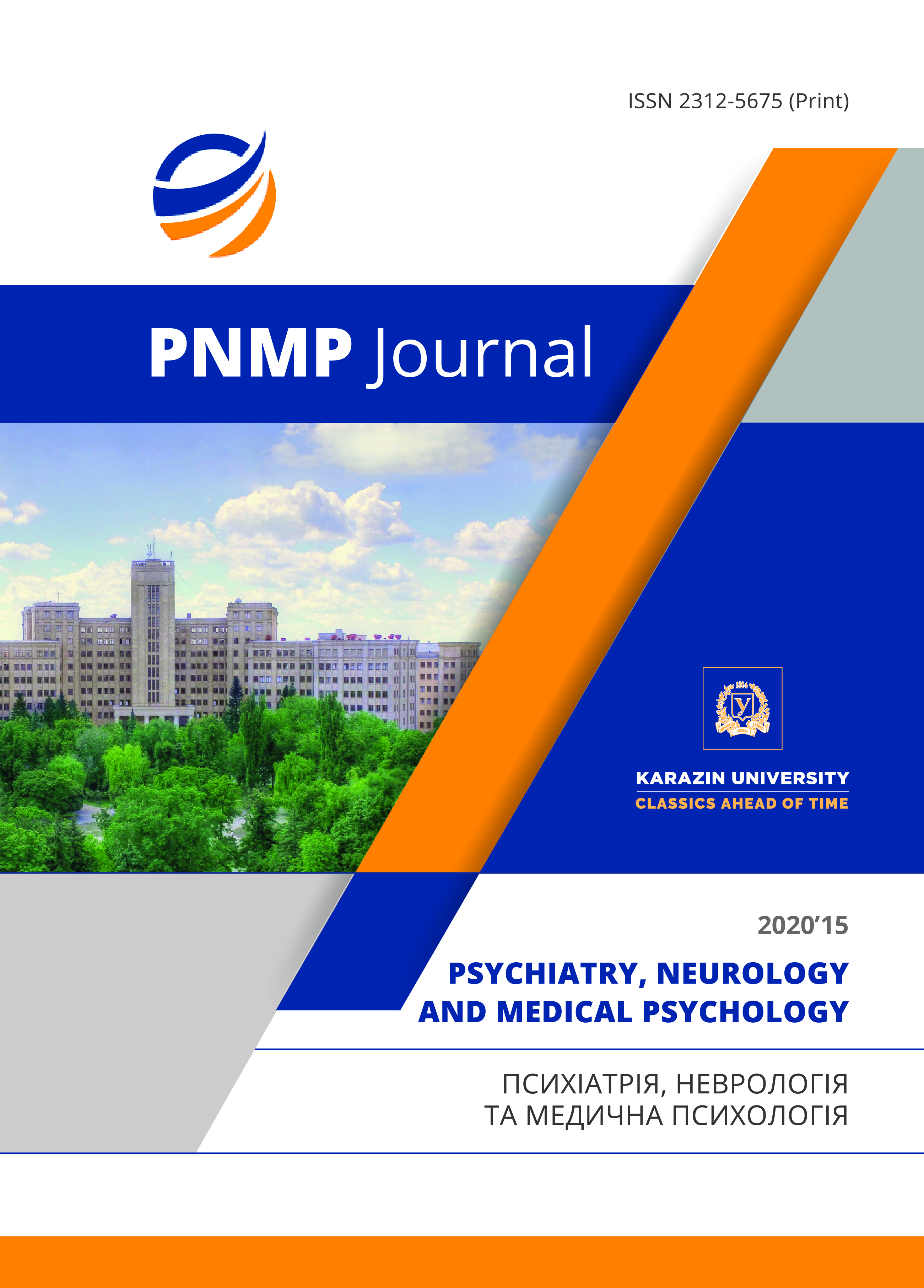Psychological interventions to reduce alcohol consumption recommended by modern clinical guidelines (review of foreign publications)
Abstract
The article presents the data of theoretical analysis of modern approaches to solving the problem of alcohol abuse; it is stated that harmful alcohol consumption will remain a global problem in the future, given the current trends in health, culture and the market around the world. The need to introduce effective and cost-effective strategies and measures to prevent and reduce the harm associated with alcohol abuse in accordance with national priorities and contexts is substantiated. The main stages of treatment are identified, namely: diagnostic and motivational (includes physical examination, choice of treatment program, conclusion of a written therapeutic agreement), detoxification (pharmacological treatment of withdrawal, strengthening the patient's motivation for further treatment), treatment of addiction syndrome (individual / group psychotherapist), symptomatic therapy), medical and social rehabilitation (supportive psychotherapy, social work). The most appropriate and effective psychotherapeutic approaches recommended by modern clinical protocols for the treatment of alcohol dependence in developed countries, including: behavioral therapy for couples (BCT), brief psychological interventions (BPI), family counseling (BSFT), cognitive-behavioral therapy (CBT), contingency management (CM), motivational therapy / motivational interviewing (MT), psychodynamic psychotherapy (PT), 12-step psychotherapy (AA). It is confirmed that the integration of psychotherapeutic and pharmacological approaches is supported in clinical guidelines for the treatment of alcohol dependence. It is concluded that improving organizational approaches to anti-alcohol therapy through the use of advanced technologies with proven effectiveness — on the one hand, as well as expanding international cooperation and adequate policy decisions — on the other hand, will reduce alcohol consumption and its negative effects in our country.
Downloads
References
Global strategy to reduce the harmful use of alcohol. 1.Alcohol drinking - adverse effects. Social control - methods. Alcoholism - prevention and control. Public policy. World Health Organization. 2010, р.44.
Batra A, Müller CA, Mann K, Heinz A. Alcohol Dependence and Harmful Use of Alcohol. Dtsch Arztebl Int. 2016, no. 113(17), pp. 301-310.
Alcohol interventions in secondary and further education NICE guideline Published: 12 August 2019 www.nice.org.uk/guidance/ng135
Gimeno C, Dorado ML, Roncero C, Szerman N, Vega P, Balanzá-Martínez V, Alvarez FJ. Treatment of Comorbid Alcohol Dependence and Anxiety Disorder: Review of the Scientific Evidence and Recommendations for Treatment. Front Psychiatry. 2017, no. 8, p. 173.
Zaleski M, Laranjeira RR, Marques ACPR, Ratto L, Romano M, Alves HNP, de Macedo Soares MB, Abelardino V, Kessler F, Brasiliano S, Nicastri S, Brunferntrinker Hochgraf P, de Paula Gigliotti A, Lemos T. Guidelines of the Brazilian Association of Studies on Alcohol and Other Drugs (ABEAD) for diagnosis and treatment of psychiatric comorbidity with alcohol and other substance and dependence. Int Rev Psychiatry. 2017, no. 29(3), pp. 254-262.
Timothy J O'Farrell, Jeremiah A Schumm, Marie M Murphy, Patrice M Muchowski. A Randomized Clinical Trial of Behavioral Couples Therapy Versus Individually-Based Treatment for Drug-Abusing Women. J Consult Clin Psychol, Аpril. 2017, no. 85 (4), pp. 309-322. DOI: 10.1037 / ccp0000185
Fals-Stewart, W., O’Farrell, T. J., & Birchler, G. R. Behavioral Couples Therapy for substance abuse: Rationale, methods, and findings. Science & Practice Perspectives. 2004, no. 2(2), pp. 30-41. DOI: 10.1151/spp042230
Babor TF, Grant M. A randomized clinical trial of brief interventions in primary health care. World Health Organization; Geneva Switzerland: 1992. Project on identification and management of alcohol-related problems. Report on Phase II. 2006, no. 33(3), pp. 108-116.
Santisteban DA, Szapocznik J, Perez-Vidal A, Kurtines WM, Murray EJ, Laperriere A. Efficacy of intervention for engaging youth and families into treatment and some variables that may contribute to differential effectiveness. J Fam Psychol. 1996, no. 10, pp. 35–44.
Carroll KM. Behavioral and cognitive behavioral treatments. In: McCrady BS, Epstein EE, editors. Addictions: a Comprehensive Guidebook. Oxford University Press; New York. 1999, 267 p.
Project MATCH Research Group Matching alcohol treatments to client heterogeneity: Project MATCH post-treatment drinking outcomes. J Stud Alcohol. 1997no. 58, pp. 7–29.
Rawson RA, Huber A, McCann MJ, Shoptaw S, Farabee D, Reiber C, et al. A comparison of contingency management and cognitive-behavioral approaches during methadone maintenance for cocaine dependence. Arch Gen Psychiatry. 2002, no. 59, pp. 817–824.
Higgins ST, Wong CJ, Badger GJ, Ogden DE, Dantona RL. Contingent reinforcement increases cocaine abstinence during outpatient treatment and 1 year follow-up. J Consult Clin Psychol. 2000, no. 68, pp. 64–72.
Petry NM, Martin B. Low-cost contingency management for treating cocaine- and opioid-abusing methadone patients. J Consult Clin Psychol. 2002, no. 70, pp. 398–405.
Prochaska JO, DiClemente Cc. Toward a comprehensive model of change. In: Miller WR, Heather N, editors. Treating addictive behaviors. Plenum; New York. 1986, pp. 3–27.
Project MATCH Research Group Matching alcoholism treatments to client heterogeneity: Project MATCH 3-year drinking outcomes. Alcohol Clin Exp Res. 1998, no. 22, pp. 1300–11.
Marlatt GA, Baer JS, Kivlahan DR, Dimeff LA, Larimer ME, Quigley LA, et al. Screening and brief intervention for high-risk college student drinkers: results from a 2-year follow-up assessment. J Consult Clin Psychol. 1998, no. 66, pp. 604–15.
Luborsky L. Principles of psychoanalytic psychotherapy: a manual for supportive–expressive psychotherapy. Basic Books; New York: 1984, 145 p.
Woody GE, Luborsky L, McLellan AT. Psychotherapy for opiate addicts: does it help? Arch Gen Psychiatry. 1983, no. 40, pp. 639–45.
Nowinski J, Baker S, Carroll KM. Twelve-step facilitation therapy manual. NIAAA, DHHS; Rockville (MD). 2013, no. 46(4), pp. 403-411.
Carroll KM, Nich C, Ball SA, McCance-Katz EF, Frankforter TF, Rounsaville BJ. One year follow-up of disulfiram and psychotherapy for cocaine-alcohol abusers. Addiction. 2000, no. 95, pp. 1335–49.

